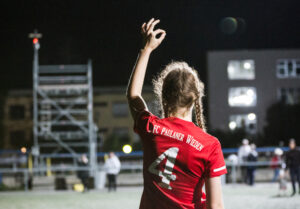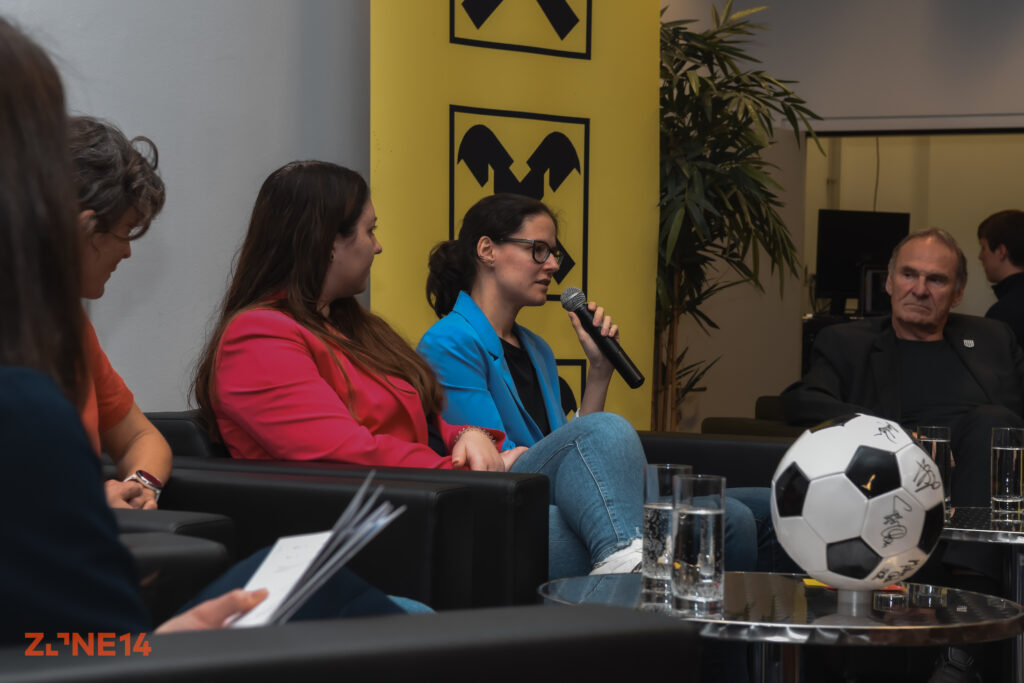
As part of our focus on women in football, we recently spoke to Anna Ressmann, who, in addition to her role as head of women's football at FC Mariahilf currently sits on the board of the women's committee of the Vienna Football Association .
My name is Anna Ressmann. I actually got into football through my godfather Rudolf Czech. At the time, he was at St Rochus, a football club that played in the DSG and also had a league team (junior team). My sister and I played with the boys there a few times. Then at some point Rochus had a women's team. We were about 17 years old then. We played there for two or three seasons and then I switched to Mariahilf. That was in 2006 and I joined the board in 2008. I've been the women's football manager at Mariahilf since 2011. In 2017, I also joined the Women's Committee of the WFV. And at the moment I'm responsible for the national league there, so I'm deputy chairwoman of the WFV women's committee for the national league and responsible for the Girls' leagues.
Basically, we have three major large pitch leagues in Vienna. Unfortunately, the Landesliga, the strongest of the three, only has eight teams this year. The first division has eleven teams and the second class has six teams. There are around 25 large field teams in total. And then we also have the small pitch teams. That's another eight plus a few in the DSG league.
There has been little development, or rather almost regression, in the women's leagues. The fact is, that we are constantly losing teams, and as a result the number of teams is stagnating or far too low. Sometimes there are fewer, sometimes more. The positive thing is that in Vienna we now have 3 leagues again, whereas recently there were only 2. We hope that the Newcomer League will develop more large pitch teams and thus increase the number of teams. But in November at least I have the latest data on the girls' and boys' leagues. And in women's football, the number of new registrations is increasing. Of course there was a significant slump in corona times. After that, however, there is an increase again. Therefore there are now also girls' leagues, at least in spring there are 30 girls' teams, who also play in the girls' leagues. These teams still existed a year and a half ago and they are the basis for more women's teams. So there is already a development and the number of female players in Vienna is increasing. But we still make up a very small proportion. In percentage terms, 7% of footballers are girls and women.
I think things have generally improved. More clubs are now offering girls' and
women's football. So something has already happened. In terms of spectator numbers,
I don't think much has changed. I don't know how we compare to the
men's national league, but far below that and also in terms of money. In the men's national league, the players already receive a decent salary, while in the women's national league, the players pay a membership fee. In financial terms, of course, we are far below that. Structural problems are still a major difficulty. That's what we want to tackle now. If you look at the distribution of pitches, so many clubs have no space for girls' and women's football. They have ten youth teams, so ten boys' teams and two men's teams. But then there's no space for the girls' or women's team? And that's exactly where we want to highlight these problems. Where we want to point this out together and make it transparent so that we can then work together to develop funding programmes to reward the clubs that offer the space. Unfortunately, many clubs still prefer to take on a subtenant because it brings in money directly or they are simply not interested enough.
Girls used to play in mixed programmes with the boys. Later there were some clubs that offered girls-only training. But it was difficult for them to to keep the girls happy. It was difficult to organise friendly matches. And joining the boys' leagues was really only for the better ones. And not every club can have the best 10 or 20 per cent of girls. That is simply not possible.
We then sat down with the clubs and looked at the areas in which age groups. So last spring we founded the girls' league. You can already see a strong increase. We started with 17 teams in the girls' leagues. There were 17 new teams that didn't exist before. We also had to realise, however, that some of the teams had to give up, so it's not so easy, but there is a positive development.
And the young girls are also the important thing, they are actually the basis. You need young talent to produce good players later on. And they have to be start as early as possible.
Yes, definitely. That was also one of the reasons why we set up the girls' leagues because girls simply start much later on average. And then you have the problem that when they play against boys, there's a big difference in experience from a sporting point of view. Because the girls start only at 13, 14 or even 15 and older.
There are several reasons. It is still partially anchored in society, that football is a men's sport, and it is often not even known which clubs offer football for girls. And also that some clubs simply don't offer girls what they want. Unfortunately, this is still the case right now, although there is an upturn in opportunities.
Well, from a general point of view, the Women's Bundesliga has a sponsor this year. Apart from the Bundesliga, however, there is no other women's league in our country. national association that has a sponsor. The women's cup is not supported by a sponsor. I don't know how the individual clubs are doing, whether they already have major sponsors on board or not. However, it is more likely that, if there are sponsors, they are more often at the Bundesliga clubs. So there is definitely room for more sponsors in our game and our leagues
Yes, definitely. - The new London Underground line as an example, it was named after the lionesses. Internationally, there are some really good examples that are being set. So if anyone would like to sponsor the girls' league or the Viennese women's leagues, companies are very welcome to get in touch.
In addition to the aforementioned structural problems of finding volunteer functionaries. The girls' teams sometimes can't find enough players. We have tried to recruit with Sara Telek and Kickmit, for example. Because they are working directly in the schools. The clubs can then write to Sara and invite players to come to training. But it all takes a lot of time. Nowadays of course, you can find many new players via social networks. But you also need Resources and a bit of expertise to do this and I think you cannot just use one recruitment method.
The world of officials is very male-dominated, which is understandable because simply there are many more footballers. And in the end, some of these footballers will become officials at some point. It's the same with female footballers and the number of players is slowly increasing which means hopefully at some point, the number of female football officials will also increase. But as a woman, you then have to also have to think about whether, in such a male-dominated field, you can really feel welcome, that's one thing. You also have to think about whether you as an association welcomes women on the board - unfortunately, this is sometimes not yet the case. Then we also have to look at whether and how we can make women feel comfortable and at ease who want to work for us. On the other hand, it is generally the case that there are simply too few footballers who are able or willing to put in the time to make a difference. I think if a few people say, okay, we want to make a difference now, then it will work. But you need a few motivated people and that's not so easy to find.
Well, most of the work in the Vienna Football Association is done by volunteers. achieved. What I would actually recommend is a lot more young people on the Board. I would like to see a rejuvenation of the structures, the majority of the players are in an age that is not represented on the Board at all. I think I'm the youngest member of the board and I'm already in my late 30s, so I'm a long way from my early 20s. There are also only two women on the entire Executive Board. We are also currently working on a five-year plan for girls' and women's football in Vienna. And, there will be a joint meeting to work out common goals. There we want to prepare everything we want to achieve in girls' and women's football and also outline a path and develop concepts on how to get there.
It's gotten a lot better, because when I was young there was simply no one I could talk to or I could identify with. There was nothing on television or anyone that I could relate to as a could have looked up to a role model. Things are much better nowadays. If you look at the young players, they have different answers as to who their role models are, sometimes male, sometimes female role models, but they are present, they know the National team players. It has now also been seen in Vienna in the friendly match against France. The stadium was full, so the potential is definitely there that enough people come and watch.
I still play football myself and have now started again after a break. It's a team sport that's a lot of fun and gives you a lot in return. Playing together and training is something very special and a pleasure and the joy that you experience on the pitch is just insanely fun. My dream is that every girl and woman in Vienna can play football. Unfortunately, there are not yet enough clubs. I would like everyone to have the opportunity to play football.
